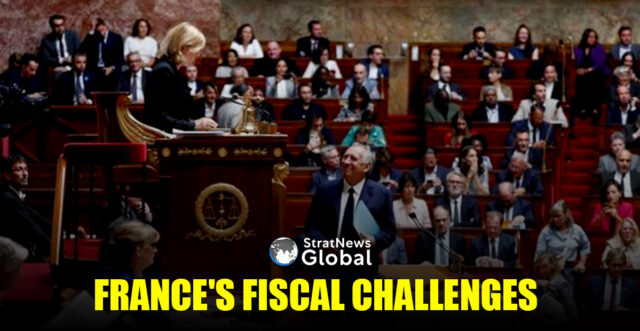Prime Minister François Bayrou cautioned that France’s financial troubles threaten the nation’s “very survival” as he braced for a defeat in Monday’s confidence vote, a result that could push the euro zone’s second-largest economy deeper into crisis.
Bayrou, President Emmanuel Macron’s fourth prime minister in less than two years, called the confidence vote over the pressure France is facing to repair its finances – with last year’s deficit nearly double the EU’s 3% limit of economic output and public debt reaching 113.9% of GDP.
“You have the power to bring down the government, but you do not have the power to erase reality,” Bayrou told lawmakers before the confidence vote.
“Reality will remain relentless: expenses will continue to rise, and the burden of debt, already unbearable, will grow heavier and more costly,” he said.
France’s “very survival is at stake,” he said.
Opposition parties have made clear they do not agree with Bayrou on how to tackle the debt, and are set to vote against his minority government.
“We regret that we cannot trust you,” Socialist lawmaker Boris Vallaud told Bayrou, and urged Macron to replace him with a left-wing prime minister.
The minority government’s collapse would deepen France’s problems as Europe seeks unity over Russia’s war in Ukraine, an increasingly dominant China and trade tensions with the United States.
The turmoil threatens France’s ability to rein in its debt, with the risk of further credit downgrades as bond spreads – a gauge of the risk premium investors demand to hold French debt – widen.
“As for political instability, those who find all this amusing would do well to remember how much of an economic poison it is,” said Laurent Wauquiez of the conservative Republicans, who back the government.
The outcome of the confidence vote may come by around 1700 GMT.
“Our country has an urgent need for lucidity, it has the most urgent need for unity. But it is division that threatens to prevail, that threatens its image and reputation,” Bayrou said.
What’s Next?
If Bayrou falls, Macron will start the search for a prime minister capable of steering a budget through parliament, less than a year after the ouster of Bayrou’s conservative predecessor Michel Barnier.
Social tensions are also heating up. Some online groups have urged the French to “block everything” on Wednesday and mainstream labour unions plan social action on September 18 against plans for budget cuts.
The departure of a fourth premier in under two years would underline a political malaise of a depth rarely seen in France since the 1958 establishment of the Fifth Republic. The post-war constitution aimed to ensure stable governance by creating a powerful, highly centralized president with a strong parliamentary majority.
Instead, Macron, whose ascent to power in 2017 blew apart the political landscape and its traditional mainstream parties, is struggling with a fractured parliament in a country not used to consensus building or dealing with coalitions.
Macron has so far ruled out dissolving parliament, as he did last year. France has been mired in a political crisis since that snap election, which resulted in an even more divided parliament where no camp has a majority.
After the fall of a conservative and a centrist as prime minister, many observers expect Macron to next seek a candidate from the centre-left Socialists.
Such a candidate would face big challenges and still need to forge a delicate alliance with the president’s liberal bloc, which opposes many of the left’s ideas, including raising taxes for the wealthiest to plug France’s financial holes.
(With inputs from Reuters)





